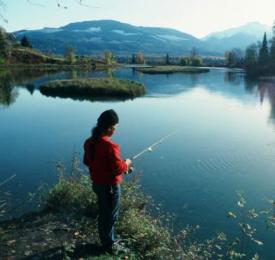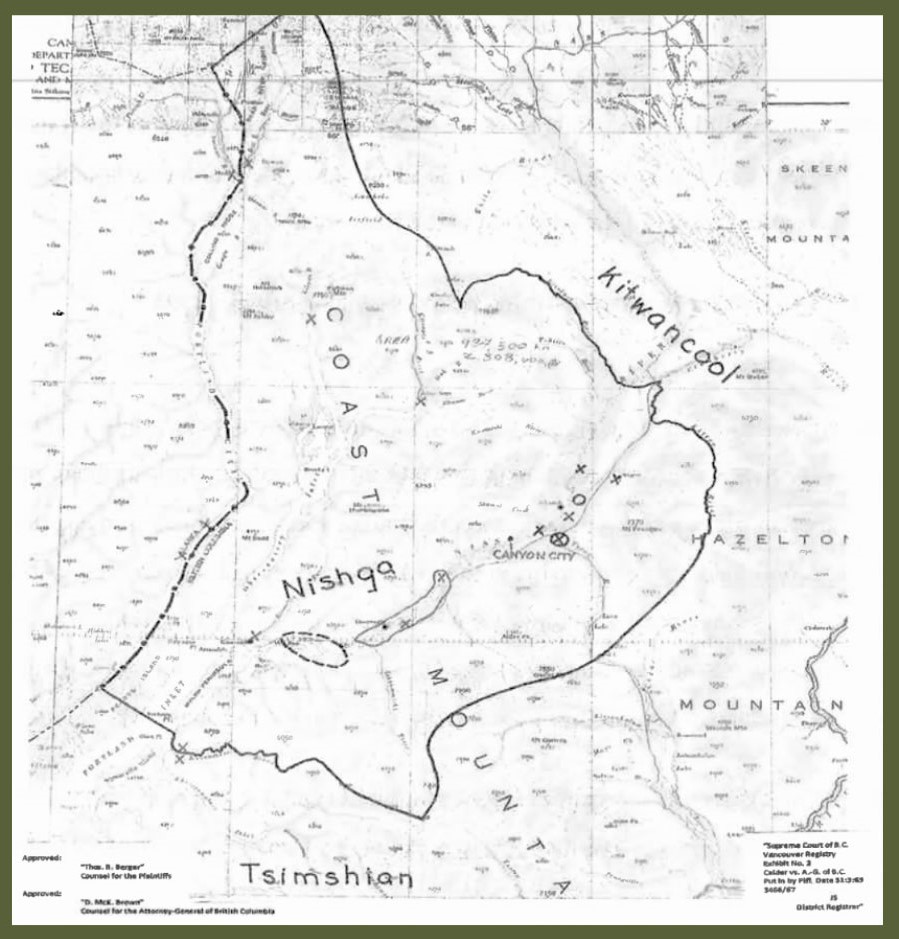The Nisg̱a’a Lisims Government has filed a lawsuit with the Supreme Court of B.C. against “Raven Clan Outlaws,” who they say are illegally occupying Nisg̱a’a Treaty territory. A treaty which came into effect in May 2000.

The occupation in question is taking place on Crown land located between km 11 and km 13 of the Nass Forest Service Road in northern British Columbia.
Despite being Crown land, the Nisg̱a’a Nation have recognized rights in the region — the Nass Wildlife area — and say Raven Clan Outlaws are interfering with those rights and damaging the territory.
That damage, they say, includes “forest resources by clear-cutting trees, erecting permanent cabins and structures, marketing accommodations, operating a farm, raising and selling livestock near waterways (and seemingly) growing and selling cannabis without a license.”
Raven Clan Outlaws say they’re simply trying to restore an aspect of life for their people.
Raven Clan Outlaws is made up of members of the Gitanyow Band who are working to establish a ranch in an area they say used to be their people’s ancient villages.
According to the Gitanyow, their traditional territory covers 1.7 million hectares of northwestern British Columbia and encompasses the area on Nass Forest Service Road, something they say was claimed more recently by the Nisg̱a’a.
Simogyet Malii Glen Williams, president of the Gitanyow, says the Nisg̱a’a have been slowly encroaching on Gitanyow territory for the last several decades.
“This (lawsuit) is just another way for them to continue to penetrate our territory,” he said.
And it’s something Gitanyow has documented at length.
“They took advantage of the fact that when they signed the treaty, one of the policies in place was the five per cent rule,” said Simogyet Gamlakyeltxw Wil Marsden, defendant named in the Nisg̱a’a Lisims Government’s suit. “So in order for them to successfully settle on their settlement lands, which is where they are now, they would have to claim the entire Nass watershed.“

Get breaking National news
In a press release sent out Thursday, the Nisg̱a’a Lisims Government said “the actions of the occupants are limiting Nisg̱a’a citizens’ ability to exercise their treaty rights to safely harvest wildlife in the area. Hunting in the vicinity of an occupied site would not only be dangerous but is also against Nisg̱a’a laws.”

The ranch is a test drive in exploring what it might look like for Gitanyow to live under its own law, on the land, explains Marsden.
“What we’re doing is taking provincial acts like the Forestry Act, the Cannabis Act, etc. and modifying it to better suit us,” he said. “All this is actual true reconciliation.”
Marsden said when it comes to the cannabis-related accusations, he’s been supplying his nation with free access to oil for health-related reasons for years.
“We just want to provide affordable oil to our members instead of having them spend hundreds of dollars – so we’re growing it ourselves.”
Marsden said they aren’t scared of the challenge.
“When we heard about the prospect of the Nisg̱a’a actually coming in and challenging us, we were very happy,” Marsden said. “If the Nisg̱a’a Treaty was signed these days, it would never pass – we’d prefer to settle it in the feast but we’re happy to go to the courts.”

In an e-mail, Nisg̱a’a Lisims Government president Eva Clayton says “unlike the Nisg̱a’a Nation, which has rights under the constitution and the United Nations Declaration on the Rights of Indigenous People to the observance of our treaty, the Gitanyow only claim — but have not yet proven or established — Aboriginal title and rights within their asserted traditional territory.”
Clayton added, “Mr. Marsden and the other Gitanyow Hereditary Chiefs have not entered into a treaty, nor have the courts confirmed any of their rights. They have acknowledged in 2021 litigation between the Nisg̱a’a Nation and British Columbia that their unproven claims do not give them a right to infringe Nisg̱a’a Treaty rights, but are now conducting activities that do so.”
Williams said they’ve provided the Nisga’a with a detailed report of the basis of Gitanyow’s claim to the region in the past.
“We’ve requested if they could tell us what their bases are for, and suggested we should come to some discussion of how we try to resolve these issues,” he said.
In the Nisg̱a’a Lisims Government release, they say they’ve “attempted to engage with the individuals at the site, but the occupiers have made it clear that they do not intend to cease their activities.”

The Nisg̱a’a Nation says the lawsuit is the first time a modern treaty nation is taking steps to enforce its treaty rights against people who are not part of the treaty.
“Nisg̱a’a Lisims Government is taking this action to protect our citizens’ rights, our traditional lands and the larger Nass Wildlife Area,” said Clayton in a release. “We believe that we have a very strong case, since the Nisg̱a’a Treaty clearly outlines our rights.”
Williams hopes the outcome sees the “error corrected.”
“Fix the serious harm that has been done to Gitanyow as a result of hastily coming to a treaty that partially includes Gitanyow territory,” he said. “And British Columbia needs to be part of the discussion of how we arrive at that.”









Comments